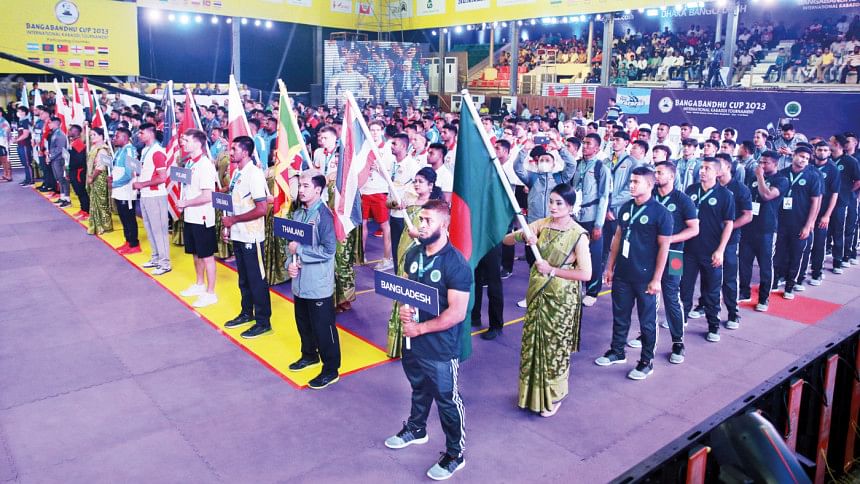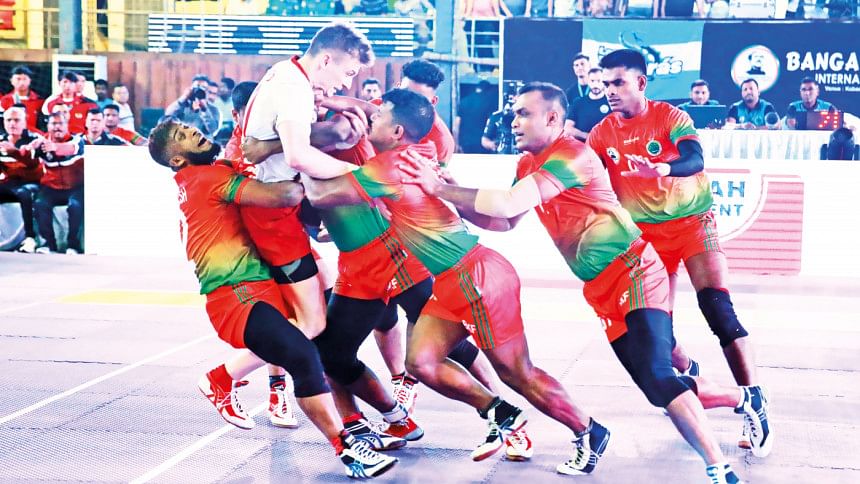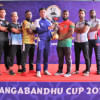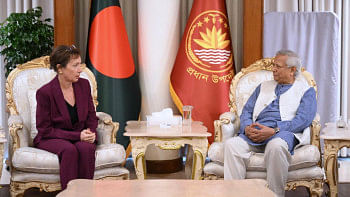Good old kabaddi’s fate hangs in balance

Kabaddi had been a lone discipline that once popped at least a medal in the Asian Games for Bangladesh but the present scenario has deviated afar.
A silver medal had also been almost guaranteed in all competitions such as Asian Kabaddi Championship, South Asian (SA) Games, Asian Games since the competitions' inception.
However, as the game which originated from the sub-continent has gradually spread out among other Asian nations, the medal from kabaddi except SA Games also went out of Bangladesh's grip due to various reasons -- lack of proper planning, patronisation that led to insecure future of the players, and so on.
Over time, with the emergence of Iran, South Korea, Pakistan, Thailand and Japan, Bangladesh are not often invited to the Asian Kabaddi Championship.
The men in red and green have also experienced a medal-drought at the Asian Games for 17 years while they struggled to consistently bag a bronze medal from SA Games, having had to stay content with five bronze medals in a row from 2004 to 2019.
Interestingly, there was a period where Bangladesh sealed successive silver medals in all the aforementioned competitions behind powerhouse India, who are still dominating the kabaddi world on the back of various initiatives in the domestic circuit. Meanwhile, Bangladesh kept lagging behind despite having a long and rich kabaddi culture in the country with the game being played in rural areas for centuries.
Initial successes have not translated into material benefits for kabaddi players as sponsors hardly came forward, in contrast to what footballers and cricketers in the country had the privilege of experiencing in the past couple of decades. The kabaddi players have been completely dependent on the defence services -- mainly in border guards, army, navy and police -- under insignificant payrolls that is also believed to be discouraging budding kabaddi players to venture into the sport.
Organisational weakness has been one of major obstacles alongside a lack of a modern kabaddi-oriented infrastructure, professionalism, patronisation from the government and sponsors, a shortage of quality players, as well as money-spinning competitions in the country.
Moreover, enough steps to promote and develop the national game of the country have not been taken in the past which has also led to a lack of infrastructure across the country, as evidenced by the National Kabaddi Stadium which remained unable to host an international tournament. Furthermore, the long absence of training facilities and proper coaching setup has also hindered the growth and development of kabaddi.

Interestingly, the government spends a lot behind the infrastructures of football, cricket, swimming and other sports but apparently stayed unwilling to equip the indoor facilities for kabaddi. It resulted in the players coming from outside Dhaka struggling to adjust to playing on a mat surface, as reflected by their performances at the international level.
However, the organisational weakness started getting minimised after the appointment of the Habibur Rahman-led ad hoc committee, which was later elected body in 2021 following a four-year ad-hoc tenure. The committee made efforts to overcome the financial crisis, which had often led to the halt of domestic competitions, hosting of Bangabandhu Cup international kabaddi tournament regularly. The introduction of IGP Cup Youth Kabaddi competition, appointment of foreign coaching staff on the basis of assignments and nursing the youth players in the training camp all are seen as positive initiatives to revive the country's traditional sport.
The Bangladesh Kabaddi Federation (BKF) also spends approximately BDT eight crore per year in which the government provides nearly one-eighth of it.
"We are holding 11 tournaments, from school competition to male and female national championships in a calendar year," BKF joint secretary SM Newas Shohag told The Daily Star.
"The positive thing is that we can organise the competitions from the Thana (police station) level because of our BKF president, who is also inspector general of police."
Having informed about the increase of mat facilities for the players in some zonal headquarters like Nilphamari, Gopalganj, Bagerhat and Moulvibazar, Shohag added that they are nursing around 85 budding players who were picked from 2nd IGP Cup in three categories for six months in a year, in a bid to strengthen the pipeline of the national team. Also, three players from the 2018 IGP Cup have already secured their places while eight other players secured jobs in different service teams.
As part of the preparation for Asian Kabaddi Championship in Korea in June and Asian Games in China in September-October this year, Bangladesh national kabaddi team are slated to leave for India in the first week of May for a long-term training, in which the players will play different matches against different clubs and states of India.
Asked how it will take Bangladesh to regain its old position, Shohag said, "Bangladesh are now at the 5th position in world ranking and we need to overcome either Pakistan or South Korea to regain the medal and we believe it is possible if the players can gain some valuable international experience and match-temperament. But we need financial support to help the players mature."
During the last Bangabandhu Cup that ensured Bangladesh's berth in 2024 Kabaddi World Cup, it was seen that ultimate champions Bangladesh lacked techniques, especially in defending and restricting the bonus points. These aspects need to be seriously addressed in order to do something significant at international level.
Although the absence of top countries like India, Iran, Pakistan and Korea in the Bangabandhu Cup drew huge criticism, many appreciated the initiative of holding the tournament that helped the local players to gain valuable experience of playing international matches.
With many kabaddi players from service teams being restricted to taking part in overseas tournaments and the long-term training due to the service laws, the BKF should consider creating a pool of players to groom them properly by sending them abroad or engaging them in extensive training at home, while introducing a cash-generating franchise league that will be a sustainable income source for the existing crop of players and be able to attract the new generation as well.
Nevertheless, to ensure the growth and development of kabaddi in Bangladesh, there is no alternative of the financial support from both government and the sponsors combined with pragmatic organisation, professionalism and good governance from the federation.

 For all latest news, follow The Daily Star's Google News channel.
For all latest news, follow The Daily Star's Google News channel. 









Comments